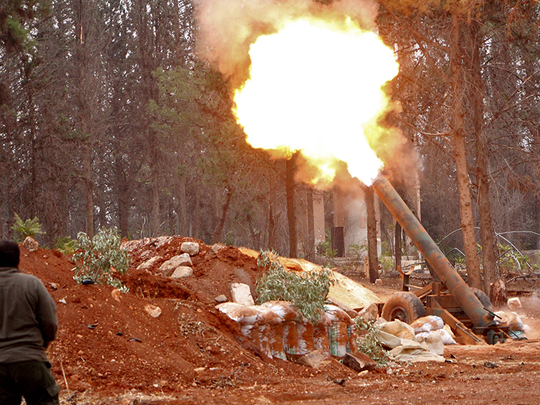
Beirut: Syrian rebels including radical Islamist groups began a counter-attack against the army and its allies on Friday aiming to break a weeks-long siege on eastern Aleppo, insurgents said.
The assault, employing heavy shelling and suicide car bombs, was mainly focused on the city’s western edge by rebels based outside Aleppo. It included Jabhat Fateh Al Sham, a former affiliate of Al Qaida previously known as Al Nusra Front, and groups fighting under the Free Syrian Army (FSA) banner.
The Syrian Observatory for Human Rights, a British-based war monitor, said more than 15 civilians had been killed and 100 wounded by rebel shelling of government-held western Aleppo.
State media reported that five civilians were killed.
There were conflicting accounts of advances in areas on the city’s outskirts.
After a three-way meeting in Moscow, the foreign ministers of Russia, Syria and Iran said their countries have agreed to intensify the fight against “terrorism” in Syria.
Russia’s Sergey Lavrov made the statement on Friday after meeting with Syrian counterpart Walid Al Muallem and Iran’s Javad Zarif.
Lavrov said at a news conference that the fight would come in parallel with efforts to improve humanitarian aid.
Syrian state media said pro-government forces repelled the attack in Aleppo as well as a militant attack by Daesh near the contested city.
The SANA news agency reported that the military and allied militias on Friday thwarted assaults on several front-lines around the government-controlled western districts of the city, while also repelling a separate Daesh assault on an Air Force academy to the city’s east.
Aleppo, Syria’s biggest pre-war city, has become the main theatre of conflict between President Bashar Al Assad, backed by Iran, Russia and Shiite militias, and Syrian rebels including groups supported by Turkey, Gulf states and the United States.
The city has been divided for years between the government-held western sector and rebel-held east, which the army and its allies put under siege this summer and where they launched a new offensive in September that medics say has killed hundreds.
Photographs showed insurgents approaching Aleppo in tanks, armoured vehicles, bulldozers, makeshift mine sweepers, pickup trucks and on motorcycles, and showed a large column of smoke rising in the distance after an explosion.
Rebels said they had taken several positions from government forces and the Observatory said they had gained control over a checkpoint at a factory in southwest Aleppo and some other points nearby.
But a Syrian military source said the army and its allies had thwarted what he called “an extensive attack” on south and west Aleppo. A state television station reported that the army had destroyed four car bombs.
Abu Anas Al Shami, a member of the Fateh Al Sham media office, said from Syria that the group had carried out two “martyrdom operations”, after which its fighters had gone in and had been able to “liberate a number of important areas”. A third such attack had been carried out by another Islamist group.
A senior official in the Levant Front, an FSA group, said: “There is a general call-up for anyone who can bear arms. The preparatory shelling started this morning,” he added.
Heavy rebel bombardment, with more than 150 rockets and shells, struck southwestern districts, the Observatory said.
Fateh Al Sham played a big part in a rebel attack in July that managed to break the government siege on eastern Aleppo for several weeks before it was reimposed.
Abu Yousuf Al Muhajir, an official from the powerful Ahrar Al Sham Islamist group, said the extent of cooperation between the different rebel factions was unusual, and that the largest axis of attack was on the western edge of the city.
“This long axis disperses the enemy and it provides us with good cover in the sense that the enemy’s attacks are not focused,” he said.
The powerful role played by Jabhat Fateh Al Sham, listed by many countries as a terrorist group, has complicated Western policy towards supporting the anti-Al Assad opposition.
The United States has prevented more powerful weapons such as anti-aircraft missiles from being supplied to rebels partly out of fear they could end up in terrorist hands.











